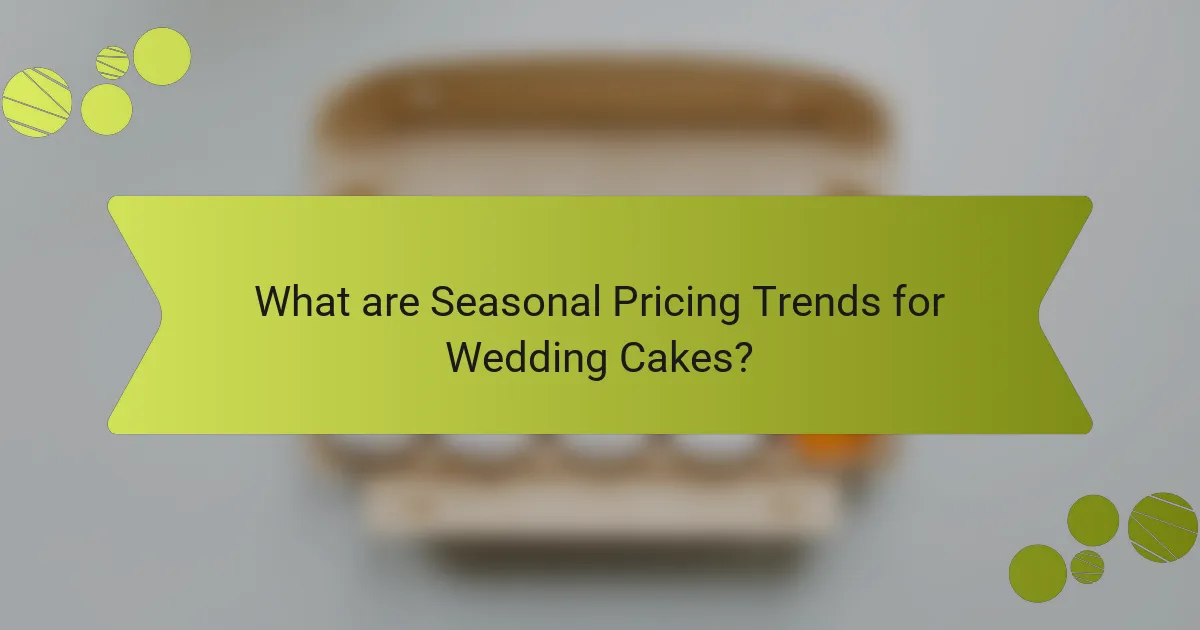Seasonal pricing trends for wedding cakes reveal that prices vary significantly based on the time of year. During peak wedding seasons, typically from late spring to early fall, demand surges, resulting in higher prices due to limited baker availability and ingredient resources. Conversely, off-peak months, such as winter and early spring, often see reduced prices as bakers offer discounts to attract customers. Couples can save up to 20% by booking their wedding cakes during these off-peak times. Factors influencing pricing include the timing of the order, cake size, design complexity, and whether to choose local bakers or pre-made decorations.

What are Seasonal Pricing Trends for Wedding Cakes?
Seasonal pricing trends for wedding cakes indicate that prices fluctuate based on the time of year. Typically, wedding cake prices are highest during peak wedding seasons, which are late spring through early fall. During these months, demand increases, leading to higher prices due to limited availability of bakers and ingredients. Conversely, prices tend to decrease in the off-peak months, such as winter and early spring. This is because fewer weddings occur, prompting bakers to offer discounts to attract customers. Research shows that couples can save up to 20% by booking their wedding cake during off-peak seasons. Additionally, many bakers offer seasonal flavors, which can impact pricing based on ingredient availability.
How do seasonal trends impact wedding cake pricing?
Seasonal trends significantly impact wedding cake pricing. Prices tend to rise during peak wedding seasons, typically late spring to early fall. This is due to higher demand for wedding services during these months. Bakers may increase prices to reflect this demand. Conversely, during off-peak seasons, prices often decrease to attract more clients. For example, winter weddings may see lower cake prices. Additionally, seasonal ingredients can affect costs. Cakes made with seasonal fruits may be less expensive when those ingredients are abundant. Overall, understanding seasonal trends helps couples budget effectively for wedding cakes.
What factors contribute to seasonal pricing variations?
Seasonal pricing variations are influenced by demand fluctuations, ingredient availability, and market competition. Increased demand during peak wedding seasons leads to higher prices for wedding cakes. Conversely, off-peak seasons often see reduced prices due to lower demand. Ingredient availability also impacts pricing; certain seasonal ingredients may be more expensive or scarce during specific times of the year. Market competition plays a role as well; bakeries may adjust prices based on competitor offerings and promotions. Historical data shows that wedding cake prices can vary by up to 30% between peak and off-peak seasons, reflecting these contributing factors.
How do wedding dates influence cake prices?
Wedding dates significantly influence cake prices due to demand fluctuations. Peak wedding seasons typically see higher cake prices because of increased demand from couples. Popular months like June and September often result in bakeries charging premium rates. Conversely, off-peak months may offer lower prices as demand decreases. Some bakeries may provide discounts for weekday weddings, which are less common. Additionally, specific holiday dates can also impact pricing, as they may coincide with higher demand. For instance, cakes for Valentine’s Day weddings may be priced higher due to the holiday’s romantic association. Therefore, couples can save money by choosing less popular wedding dates.
Why is it important to understand seasonal pricing for wedding cakes?
Understanding seasonal pricing for wedding cakes is crucial for budget management. Prices fluctuate based on demand during peak wedding seasons. For example, summer months often see higher costs due to increased demand. Conversely, off-peak seasons may offer discounts or lower prices. Knowing these trends helps couples plan their budgets effectively. It allows for strategic purchasing to maximize value. Additionally, understanding seasonal pricing can lead to better vendor negotiations. Couples can secure their desired cake at a reasonable price.
What advantages does timing your purchase offer?
Timing your purchase offers significant advantages, particularly in the context of seasonal pricing trends for wedding cakes. Purchasing during off-peak seasons can lead to lower prices due to reduced demand. For example, wedding cake prices may drop in winter months compared to summer. Additionally, cake designers may provide discounts or special offers to attract customers during slower periods. This can result in substantial savings, sometimes up to 30% off standard prices. Furthermore, timing your purchase allows for better selection, as popular designs may be more readily available when demand is lower. Overall, strategic timing can enhance both affordability and choice when buying wedding cakes.
How can seasonal pricing affect your overall wedding budget?
Seasonal pricing can significantly impact your overall wedding budget. Vendors often charge lower rates during off-peak seasons. This can lead to substantial savings on services like catering, venue rentals, and wedding cakes. For example, booking a wedding cake in winter can save you up to 30% compared to peak summer prices. Additionally, lower demand during off-peak times can lead to more negotiation power with vendors. Couples can capitalize on these seasonal trends to allocate funds to other wedding elements. Overall, understanding seasonal pricing allows for strategic budget management.

When is the Best Time to Buy Wedding Cakes?
The best time to buy wedding cakes is typically six to nine months before the wedding date. This timeframe allows couples to secure their preferred baker and flavor options. Additionally, many bakers offer discounts during off-peak wedding seasons. The months of January through March often see lower demand, leading to better pricing. Booking early also ensures availability of custom designs and flavors. Couples should schedule tastings and consultations during this period for optimal choices.
What are the peak seasons for wedding cake purchases?
The peak seasons for wedding cake purchases are typically spring and summer. These seasons coincide with the majority of weddings, which occur from May to October. According to The Knot, approximately 60% of weddings take place during this period. As a result, bakeries experience higher demand for wedding cakes, leading to increased prices. Additionally, fall can also see a rise in wedding cake purchases, particularly around September and October. Overall, couples planning weddings during these peak seasons should expect more competitive pricing and selection.
How do holidays and special events affect cake availability and pricing?
Holidays and special events significantly impact cake availability and pricing. During these times, demand for cakes increases, leading to limited availability. Bakers often have to manage higher orders, which can strain resources. This increased demand typically results in higher prices for cakes. For instance, prices can rise by 20% or more during peak seasons like weddings or holidays. Additionally, unique designs or flavors may become less accessible as bakers prioritize popular choices. Therefore, planning ahead is crucial for securing both availability and favorable pricing.
What months tend to offer the best deals on wedding cakes?
January and February tend to offer the best deals on wedding cakes. These months are typically off-peak for weddings, leading to lower demand. Bakeries often provide discounts to attract customers during this slow season. Additionally, many couples plan weddings for late spring or summer. As a result, they may book cakes in advance during these quieter months, allowing bakeries to offer competitive pricing.
How can you identify the right time to order your wedding cake?
To identify the right time to order your wedding cake, consider booking it six months in advance. This timeframe allows for proper planning and customization. Many bakeries recommend this lead time to ensure availability. Additionally, ordering early can help you avoid peak wedding seasons. Peak seasons often see higher prices and limited options. Research shows that ordering off-peak can save you up to 20% on costs. Monitor local cake trends and seasonal flavors to make the best choice. Engaging with your bakery early can provide insights into special promotions.
What indicators suggest it’s time to start cake shopping?
Key indicators that suggest it’s time to start cake shopping include approaching wedding dates and seasonal trends. Wedding planners recommend starting cake shopping at least three to six months before the event. This timeframe allows for tastings and design discussions. Additionally, seasonal pricing trends can affect cake costs. Off-peak seasons often present better deals. Noticing local bakeries promoting seasonal flavors is another sign to begin shopping. Lastly, if you have a specific cake design in mind, starting early ensures availability and customization options.
How does booking in advance influence pricing?
Booking in advance generally leads to lower pricing for wedding cakes. Early reservations allow bakeries to manage their production schedules more efficiently. This often results in better pricing as demand fluctuates closer to event dates. According to industry data, couples who book six months in advance can save up to 20% compared to last-minute orders. Additionally, bakeries may offer discounts for early commitments to secure business. This trend is particularly evident during peak wedding seasons when demand surges. Therefore, booking in advance can significantly impact the overall cost of wedding cakes.

What Strategies Can Help You Save on Wedding Cakes?
To save on wedding cakes, consider ordering during off-peak seasons. Many bakeries offer discounts for weddings held in winter or early spring. Additionally, choosing a smaller cake with a simple design can significantly reduce costs. Opting for a sheet cake instead of a multi-tiered cake can also save money.
Another strategy is to limit custom decorations. Pre-made decorations are often less expensive than bespoke options. Moreover, ordering from a local bakery rather than a high-end shop can lead to savings. Finally, consider baking your own cake or asking a friend with baking skills for help. These strategies can help you manage your wedding cake budget effectively.
What are some effective tips for finding discounts on wedding cakes?
To find discounts on wedding cakes, start by researching seasonal pricing trends. Wedding cake prices often drop during off-peak seasons, typically late fall and winter. Additionally, consider booking tastings and consultations during weekdays. Many bakeries offer discounts for weekday orders.
Another effective strategy is to compare prices from multiple bakeries. This helps identify competitive pricing and potential discounts. Joining wedding forums or social media groups can provide insights into special promotions.
Lastly, inquire about package deals that include other wedding services. Some bakeries offer discounts when cakes are part of a larger package. Engaging with local bakeries early can also lead to personalized discounts or promotions.
How can comparison shopping lead to better deals?
Comparison shopping can lead to better deals by allowing consumers to evaluate prices from multiple retailers. This process helps identify the lowest price for a desired product. Consumers can also compare product features and quality. By analyzing these aspects, shoppers make informed decisions. Research shows that consumers can save an average of 20% by comparing prices. Additionally, retailers may adjust prices based on competitor offerings. This competition can result in lower prices for consumers. Overall, comparison shopping empowers buyers to secure the best possible deals.
What role do tastings and consultations play in securing a good price?
Tastings and consultations play a crucial role in securing a good price for wedding cakes. They allow couples to assess quality and flavor directly. This firsthand experience can lead to informed negotiations about pricing. When couples express their preferences during consultations, bakers may offer tailored packages or discounts. Additionally, tastings can reveal seasonal specialties that might be more affordable. Understanding the baker’s offerings through consultations can lead to better value. This approach can also foster relationships, encouraging bakers to provide better deals. Overall, tastings and consultations enhance decision-making and can lead to cost-effective choices.
What should you consider when negotiating with cake vendors?
When negotiating with cake vendors, consider pricing, quality, and customization options. Pricing should reflect the vendor’s experience and the cake’s complexity. Quality is crucial; request samples to assess taste and design. Customization options include flavors, designs, and dietary restrictions. Understand seasonal trends, as prices may vary throughout the year. Research vendors’ reviews and compare offerings to ensure value. Establish a clear budget to guide negotiations effectively. Communicate your vision to align expectations with the vendor’s capabilities.
How can you leverage seasonal trends in negotiations?
You can leverage seasonal trends in negotiations by timing your discussions to align with peak and off-peak seasons. For wedding cakes, demand typically spikes during popular wedding months. This means suppliers may have less flexibility on pricing during these times. Conversely, negotiating during off-peak seasons can result in better deals. Suppliers often offer discounts to attract business when demand is low. Research indicates that wedding cake prices can drop by 10-20% during off-peak months. Additionally, understanding seasonal trends allows you to prepare for negotiations with data on pricing fluctuations. This strategy enhances your bargaining position, leading to more favorable outcomes.
What questions should you ask to get the best price?
What questions should you ask to get the best price? Start by asking about seasonal discounts. Inquire if there are specific times when prices drop. Ask about package deals or bulk discounts for multiple tiers. Request information on any upcoming promotions or sales events. Confirm if the bakery offers price matching against competitors. Check for additional costs like delivery or setup fees. Lastly, ask about customization options that might affect the price. These questions help identify the best pricing opportunities.
What common pitfalls should you avoid when purchasing a wedding cake?
Avoiding common pitfalls when purchasing a wedding cake is essential for a successful selection. First, do not rush the decision. Many couples overlook the importance of tasting samples before finalizing their choice. Skipping this step can lead to dissatisfaction with the cake’s flavor. Second, avoid ignoring budget constraints. Wedding cakes can vary significantly in price, so it is crucial to set a budget beforehand. Not doing so may result in overspending. Third, do not neglect to consider guest count. Ordering a cake that is too small can lead to shortages during the celebration. Fourth, avoid choosing a design that is overly complicated. Intricate designs can increase costs and may not hold up well during transportation. Lastly, do not forget to review the contract thoroughly. Hidden fees or unclear terms can lead to unexpected costs. Being aware of these pitfalls can enhance the wedding cake purchasing experience.
How can last-minute purchases impact your budget?
Last-minute purchases can significantly strain your budget. They often lead to higher prices due to urgency. For example, wedding cakes may cost more when ordered close to the event date. Vendors may charge a premium for rush orders. This can result in overspending compared to planning ahead. A study by the National Retail Federation indicates that last-minute shoppers can spend up to 20% more than those who plan. Additionally, last-minute decisions may limit options, forcing buyers to settle for less desirable choices. This can further impact overall satisfaction and perceived value.
What mistakes do couples often make regarding cake selection and pricing?
Couples often make mistakes in cake selection and pricing by not researching ahead of time. They frequently underestimate the importance of seasonality in pricing. Cakes can be significantly cheaper during off-peak wedding seasons. Many couples also fail to consider guest count when choosing cake size. This can lead to ordering too much or too little cake. Additionally, couples often overlook the total cost, including delivery and setup fees. They may focus solely on the base price per slice. Finally, couples sometimes choose designs that exceed their budget without consulting their baker. This can result in unexpected costs that strain their overall wedding budget.
Seasonal pricing trends for wedding cakes highlight how prices fluctuate based on the time of year, with higher costs during peak wedding seasons and lower prices in off-peak months. The article outlines the factors contributing to these variations, including demand, ingredient availability, and market competition. It emphasizes the importance of understanding these trends for effective budgeting and strategic purchasing, as couples can save significantly by timing their cake orders wisely. Additionally, it offers tips on negotiation tactics, effective shopping strategies, and common pitfalls to avoid when selecting a wedding cake.
